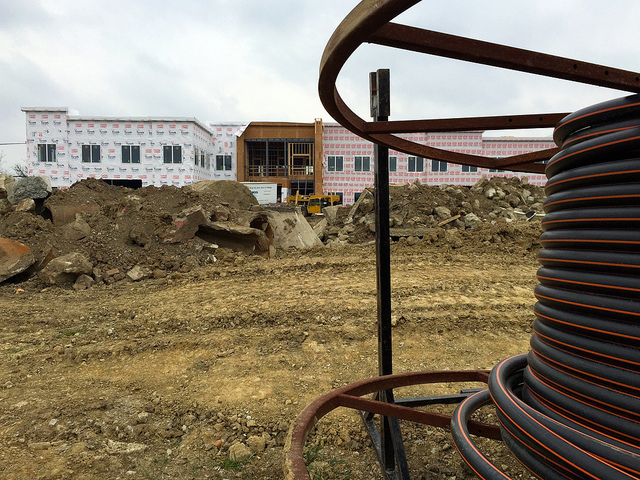Writer / Neal G. Moore
The end of each year is a good time to take stock in how businesses performed during the previous twelve months. It’s also the right time to review the work of those responsible for the people’s business. Lawrence Community Newsletter sat down recently with two leaders of the Lawrence Common Council—one Republic, one Democrat—to discuss what went right for the Council, and what needs further attention.
Tom Shevlot, an at-large GOP councilor and chairman of the Administration, Budget & Finance Committee, and Carl Barnett, Democratic representative for Council District 1—the city’s largest—are in agreement that passage of a new city budget was the body’s most significant accomplishment of 2014. “After a lot of work we passed a budget nine to zero [votes]. That’s four Democrats and five Republicans,” Shevlot said. Barnett added, “From the history of Lawrence, that I know, I believe this is the first time the council has actually pulled together on decisions, bipartisan-wise.” A bit hyperbolic, perhaps, but it is worth noting that the budget passed unanimously.
Highlights included three-percent pay cuts-invoked two years ago to close a budget gap-that were restored to civilian employees, and budget moves targeting public safety. “We were able to find money to hire four new police officers,” said Shevlot. ”Since I’ve been on the council, that hasn’t happened in the last three years.” Monies were also appropriated to purchase a fire department ladder and make repairs to several ambulances.
Barnett believes that communication among councilors on both sides of the aisle has improved, leading to a more productive environment. “I think this year is the first time [the budget process] has gone as smoothly as it has, because of the bipartisanship,” offered Barnett. “I’ve always wanted to have a situation where all the councilors knew exactly what they were doing. I didn’t want what I call the ‘blue light special’, where you come in there and all of sudden somebody says well this is okay, just vote on it,” he added. “I always thought my job was to change minds, and I see that happening now. We’re starting to take the politics out.”
There also was considerable talk about the problems that still hound Lawrence: not surprisingly money and politics. “I have, per capita, probably the lowest income district, even though it’s the largest populated district,” complained Barnett, whose district sits south of 56th Street and is roughly sixty-three percent African-American and Latino. “Some of the projects that come [to Lawrence] are not geared toward that district.” Barnett also is skeptical about both the quality and value of economic development achievements by the city. “I don’t agree with the types of businesses we’re getting here. We’re getting pizza parlors, tattoo parlors, hookah bars—that’s not business.”
What Barnett doesn’t cite are significant retail and housing projects currently under construction, albeit north of 56th Street. A multi-use office, retail and restaurant project is rising in the Fort Village. Soon to follow will be scores of single-family homes. To be fair, the city can rightly point to these as evidences of economic development that bring jobs and prestige to Lawrence. “More people are going to come. I think the answer is we’re past the promises now,” said Tim Joyce, city economic development director in an earlier interview.
Both councillors also took aim at what they called a failure by the city administration to enforce zoning ordinances in an equitable, consistent way. Barnett—who is vice chairman of the Zoning Committee—complained that violation of city safety, cleanliness, and building codes by disinterested property owners and off-site landlords are routinely ignored, particularly in his council district. “The city’s not doing what it’s supposed to do. We have a lot of code violations that are not being enforced.” Both councilors believe such oversights are, at least sometimes, politically motivated. “To me it’s a conscience choice not to,” said Shevlot. “Is it a question of manpower? Or, are there directives to work otherwise or work elsewhere? I don’t know the answer to that.”
Happily, both councilors agree that Lawrence Police Department does a good job, though Barnett would like more interaction between officers and the community. “It’s not performance. It’s more the image. You want people that the community can relate to the police department.”
Next month, we’ll hear from the city administration as it looks back at 2014, and what’s in store for the coming year.






